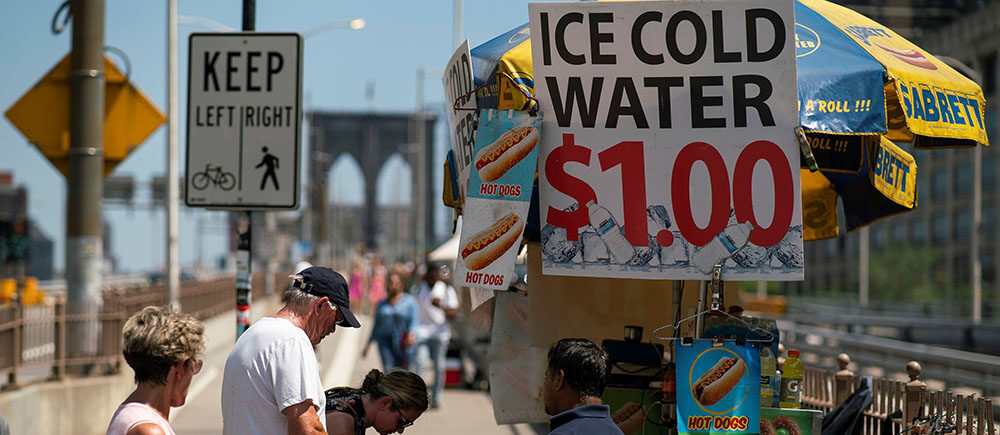According to Euronews.green “Rising sea levels and climate change mean London’s flood defences are due for an upgrade”. Boo. Rising sea levels and climate change. A double-whammy. But here’s the really scary part: “Sea levels are projected to rise by around a metre by 2100 and storms are becoming increasingly intense due to climate change.” What’s so scary? Well, that a would-be reputable news source would say “storms are becoming increasingly intense due to climate change” when (a) storms are not becoming increasingly intense at all so it’s nonsensical to list reasons for it and (b) if storms were getting more intense it wouldn’t be because of climate change, it would be climate change. Also (c) sea levels are not projected to rise a metre by 2100 and (d) if they did we’d build dykes. Other than that, world ends.
Our first reaction about “projected to rise by around a metre” was “Sez who?” Well, see, according to that unimpeachable source another Euronews.green story, “The impact of rising sea levels is being ‘underestimated’, scientists warn”. Scientists, no less. And when they warn, we’d better listen. Except uh if scientists are warning, who’s underestimating? Aaack, what’s this? More scientists. The scientists who warn are warning that the scientists who warn aren’t warning enough. Maybe.
Yup. It’s a firm maybe. You see:
“Current models predict that the most widespread flooding and coastal erosion will occur after sea levels rise by several metres – a seemingly distant scenario. This might be wrong.”
Oh might it? We also might be about to win the lottery, but we’re not signing the mansion purchase agreement just yet. So how might?
Not very might. Disappointingly little, indeed, if you love disaster:
“Rising sea levels could cover more than twice as much land as previously thought by the end of the century, new research has revealed.”
Thought by whom? There seems to be a lot more credulous hearsay than old-fashioned hard-boiled “if your mother says she loves you, check it out” about this kind of journalism. And indeed the story here is that the computer models that everyone says are utterly reliable are not utterly reliable or even slightly so, according to one speculative paper by “Experts at the Dutch firm Data” who think not that the seas are rising faster but that older studies failed to realize how low some coastlines are due to radar struggling to penetrate vegetation and find the real ground.
It’s somewhat unscary in that it means we’re already living closer to the rising seas than some boffins thought without actually noticing it because nothing bad is happening. Unless their study isn’t right either. But what the heck, run with it:
“Around 110 million people currently live on land that is below sea level, often protected by walls and other coastal defences. After two metres of sea level rise, this number will increase by 240 million people, the study estimates.”
Obviously this prospect is unbelievably terrible, since the 110 million people already doing it are… um… fine. Unless they live in poor countries, because there natural disasters of all kinds kill people whether they are above or below sea level. In the Netherlands, they’re fine.
So if global per capita GDP keeps rising faster than the raging tides of Eurogreen hype, you’ll have 240 million people living in cool places protected from the ocean by high-tech, well-engineered “walls and other coastal defences”. (Frankly one wonders what the people living on land below sea level and not protected by anything are doing on land not at sea but the story doesn’t say.)
And another thing. Two metres? Where did two metres come from? A story ago they were trying to scare us silly with one metre and then suddenly they doubled it just for effect.
In the real world Wikipedia claims that sea levels have, on average, been rising recently around 4.62 mm/y and “Climate change due to human activities is the main cause.” Note, again, that in their view rising seas are not an example of climate change but are caused by it, making you wonder what they think “climate change” is.
Or where they think this vast surge is coming from. The current level is above the overall 20th-century average but not much above the average for significant portions of that century. And if they keep doing so, well, it’s 462 mm in a century. And in case what scares you isn’t alarmism but the metric system, that’s 18.2 inches, fully (gasp) a foot and a half.
Returning to our millimetres, it’s also about 46 cm or uh gee let’s see here less than half a metre. If sea level rise were to double, and stay doubled, you still wouldn’t get that metre in a century. And two metres would take over two centuries.
So relax. At least about that issue. If humans are still around in 200 years, despite our various follies, panics and misdeeds, we will be able to build a long six-foot wall. Really we will. Especially since the first story actually says:
“The announcement came as they marked the 40th anniversary of the Thames Barrier, which defends the capital against flooding. Though initially intended to protect London until 2030, the moveable barrier and the city’s wider flood defences will function until 2070, the UK’s Environment Agency expects. But sea levels are projected to rise by around a metre by 2100 and storms are becoming increasingly intense due to climate change.”
Yeah yeah yeah. But leaving out the last bit, the thing built in 1984 is still going to work until 2070. How scary is that?
Oh wait. Not scary at all. Better invent some extra-spooky scenario. So the second Euronews.green story wails that:
“In a high emissions scenario – of global heating of 4°C above pre-industrial levels – the world’s oceans could rise 1.3 metres by 2100, and could reach as high as five metres by 2300.”
Still no two metres in a century. And the usual problem that if the oceans are washing away cities from London to Bangkok it’s a tiny bit hard to believe GHG emissions will continue to soar. And yes, of course the “high emissions scenario” is RCP8.5. It would be. And to be fair, its zombie-like persistence even after being thoroughly and repeatedly killed is a bit ominous.



In regard to the forecasting of more extreme weather events, it would be helpful to have CDN take a look at the increased activity of the sun coupled with the weakening magnetic field and how that is driving the weather conditions of the earth. Last week's auroral events may be a precursor to more extreme events.
They forget that sea levels have been rising since the end of the last ice age/glacial period.During this present interglacial period the first few thousand
years saw dramatic rates of sea level rise,far more than present rates of sea level rise.So yes it IS climate change,normal,natural,and variable.
And NOT caused by human activity.
This idiocy still begets this observation. Antarctica average annual temp is ~ minus 48C or 48C below the MELTING temp. Ergo how could a 4C rise start the ice sheet melt?? Ice does not melt at MINUS 48C.
Real question. How to get the political and media morons to stop the false panic?
Next question. Is the public really as stupid as all this world doom and death and tax stealing implies?
Last question. Are we really understanding that we are suppose to be living in democracy?
Maybe humanity is more lost than found.
"...if storms were getting more intense it wouldn’t be because of climate change, it would be climate change..."
Would you say the same if it was reported that the price of butter went up because of inflation? "No, that IS inflation." Inflation is a *general* increase in prices, typically caused by governments "printing money." But the price of butter might increase for other, market-related reasons, even during deflationary periods. So it would be a mistake to suggest that it "is" inflation rather than "because of" inflation.
In the case of storms getting more intense, it could be because of plate tectonics, or cosmic ray effects on clouds, or any number of hypothetical things unrelated to temperature fluctuations. Storms are merely one aspect of climate, which can in principle change without it signifying anything more general about climate change.